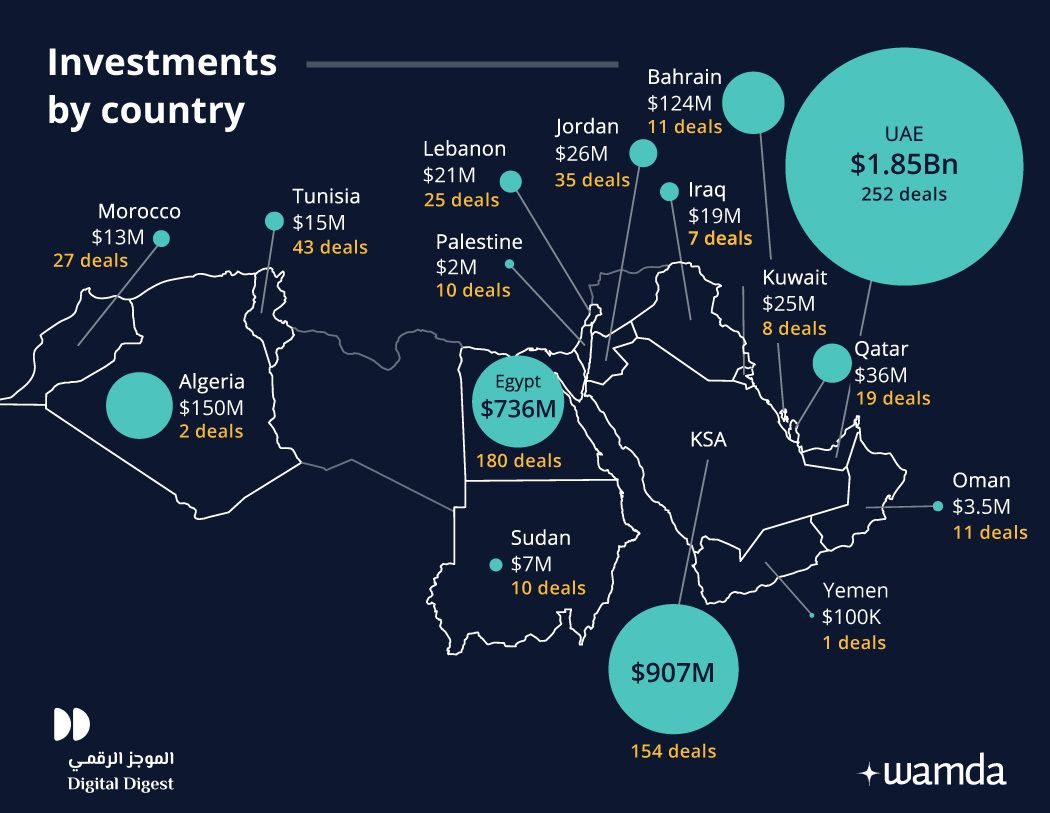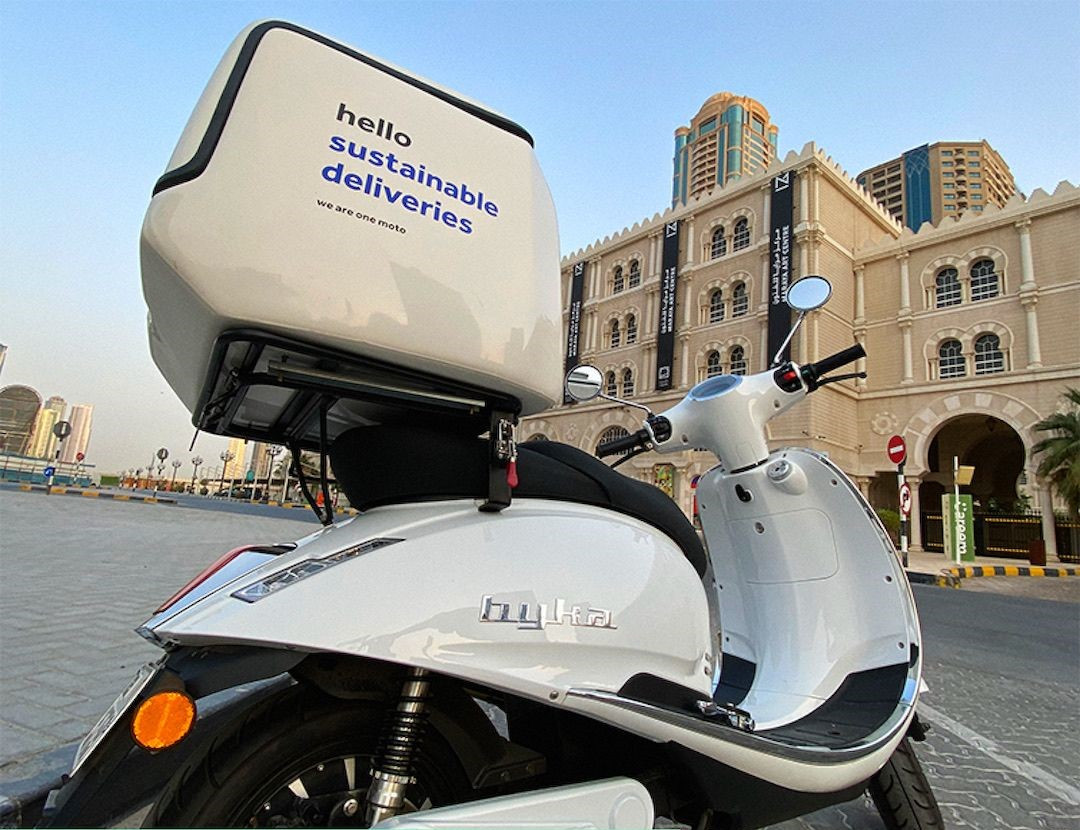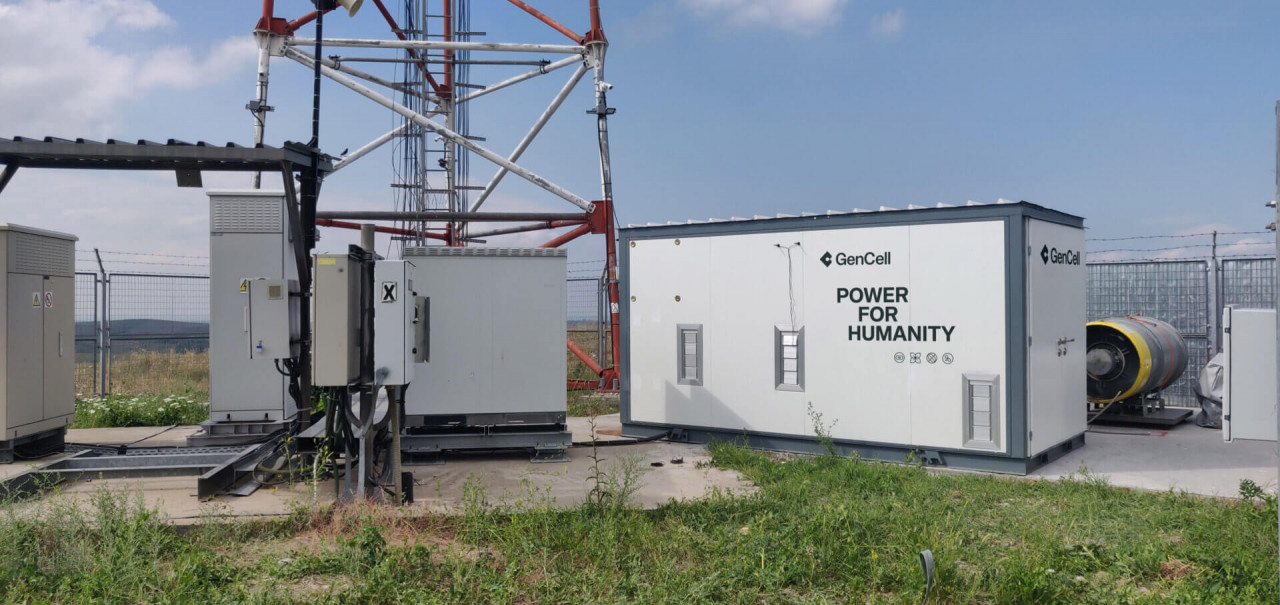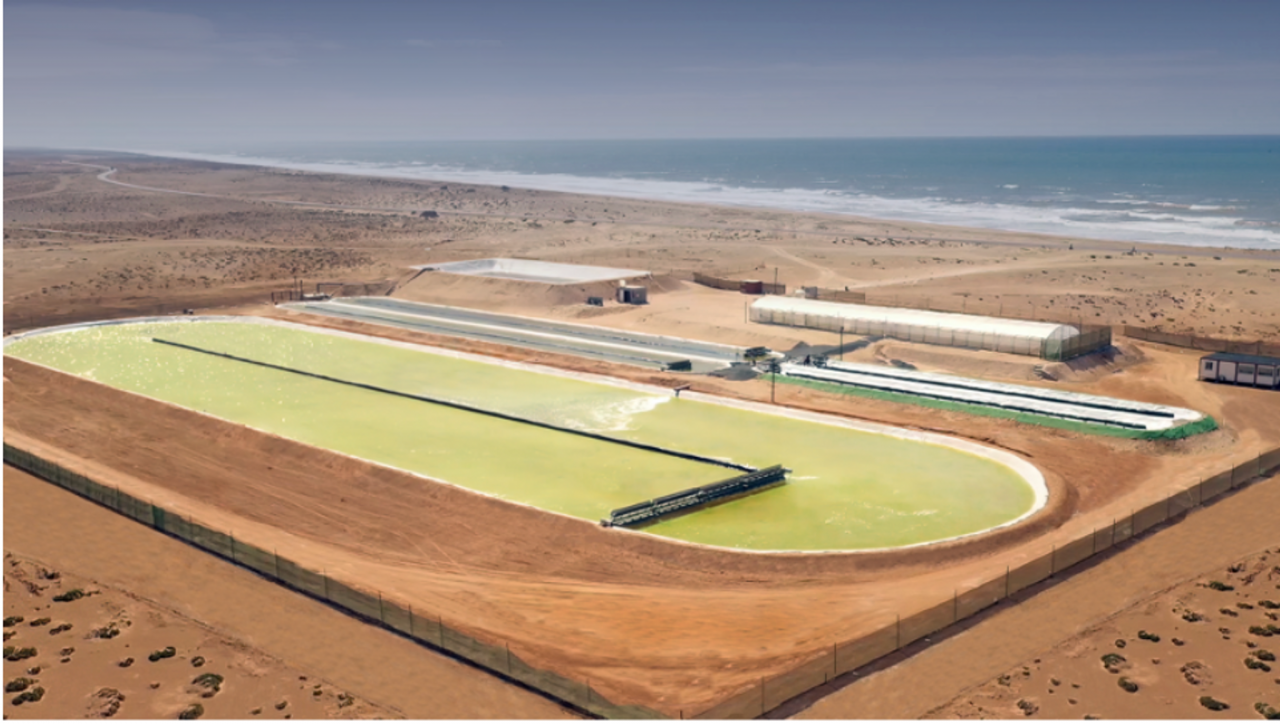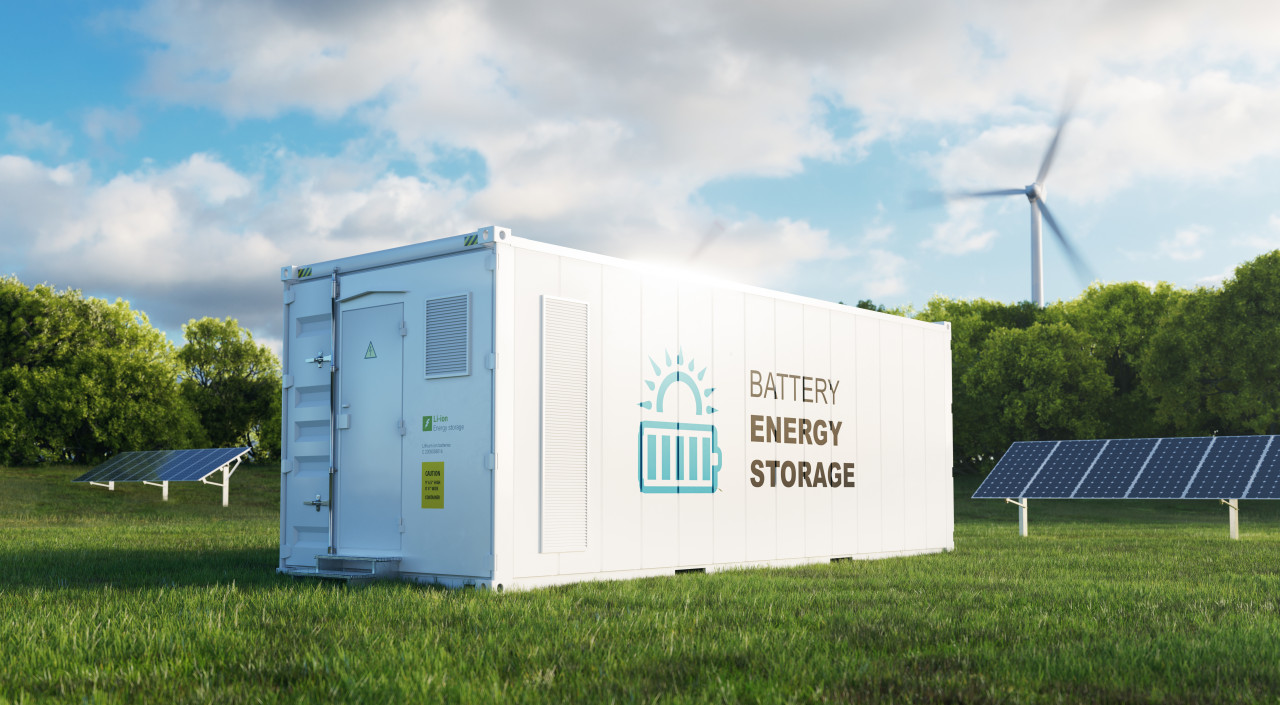Cleantech Startups in the MENA Region
Cleantech startups in the MENA region are helping their countries transition towards a sustainable and low-carbon future. Backed by government-led initiatives, venture capital funds and an entrepreneurial spirit, a new landscape for cleantech advancements is emerging in the region.
Young entrepreneurs and a growing number of startups are trying to bring novel solutions to environmental and climate challenges facing the Middle East and North Africa region.
According to Wamda, startups in the MENA region raised about $4 billion in 2022 with heavy deal concentration in the United Arab Emirates, Saudi Arabia, and Egypt. Apart from these markets, an uptick in investments was also witnessed in Algeria, Bahrain, Oman, Iraq, Qatar, Sudan, and Tunisia. Sector-wise, fintech dominated the investment landscape in the MENA region, followed by startups in the cleantech and the logistics sector.
Cleantech startups refer to organizations that offer solutions and generate financial returns while minimizing negative effects on the environment. These include a broad range of startups offering products and services in renewable energy, energy efficiency, energy storage solutions, electric mobility, GHG capture, recycling, and others. The Middle East, traditionally associated with oil and gas, is witnessing a paradigm shift towards sustainable energy solutions. Cleantech startups in the region, particularly in the UAE and Saudi Arabia, are capitalizing on abundant solar resources, wind energy potential, and the growing awareness of environmental issues.
According to Wamda, of the $3.94 billion of regional investment through 795 deals finalized in 2022, the UAE attracted roughly 47 percent with $1.85 billion across 250 deals, followed by Saudi Arabia ($907 million in 153 deals) and Egypt ($736 million in 180 deals).
Experts bullish on the regional startup ecosystem emphasize that sovereign wealth funds (SWFs) such as Mubadala Investment Company and ADQ in the UAE and Public Investment Fund (PIF) in Saudi Arabia have helped shape the startup ecosystem locally. These funds have seeded and raised venture capital funds in the region willing to invest at all stages of the startup journey, which has led to regulators launching initiatives to build the best environments for entrepreneurs.
Further, government policies and initiatives such as the UAE's 'Green Growth Strategy' and Saudi Arabia's 'Vision 2030', have helped move the needle and fostered the growth of cleantech startups. These initiatives provide financial incentives, regulatory frameworks, and research and development support, creating an environment conducive to innovation and entrepreneurship.
Apart from these drivers, startup accelerator programs such as Google Climate Accelerator program and the UAE's ADNOC's (Abu Dhabi National Oil Company) $1 million Decarbonization Technology Challenge in collaboration with Amazon Web Services, bp, hub 71, and Net Zero Technology Centre have, too, contributed to building a formidable cleantech startup ecosystem.
Here, ETN highlights the notable cleantech startups in the MENA region supporting the development of a sustainable and innovation-led economy.
Startups in the Renewable Energy and Energy Storage Sector
Enerwhere
Founded in 2012 by Daniel Zywietz, Enerwhere uses data analytics, solar, and storage to bring clean power to commercial and industrial customers and decarbonize the temporary power market. The startup claims its solar hybrid microgrids save 30-50 percent of diesel consumption and carbon emissions, compared with conventional diesel generators.
Hydro Wind Energy
Co-founded by Maryam Hassani and Hayk Vasilyan in 2020, the UAE-based startup harnesses offshore wind through vertical axis wind rotors and utilizes mechanical-based energy storage systems to provide low-cost, clean electrical energy and grid-scale energy storage. Hydro Wind Energy is focused on developing technologies that could help solve three of the biggest challenges of the 21st century: low-cost clean electricity, grid-scale energy storage, and water desalination at small and large scale.
KarmSolar
Founded by Ahmed Zahran, Randa Fahmy, Yumna Madi, and Xavier Auclair in 2011, KarmSolar is an Egypt-based startup that aims to empower Egyptian businesses and communities with renewable energy. The startup's first solar-water pumping project, in Egypt's Western Desert, will use its patented technology to build the region's first solar grid in Marsa Alam for powering a network of resorts with solar energy. KarmSolar offers solar energy solutions for off-grid and on-grid applications and has expertise in delivering cost-competitive standalone solar energy applications.
KESK
Founded in 2017 by Basima Abdulrahman, KESK is said to be the first Iraqi greentech company that combines the power of renewable energy and cloud computing technologies to build alternative energy projects. In July 2021, KESK secured a six-figure seed funding round from Euphrates Venture Capital Fund. The funding was utilized to roll out the company's proprietary solar AC unit and to secure technical support to overcome a lot of the challenges of growing a business in Iraq.
Mirai Solar
Founded in 2019, Mirai Solar is a Saudi Arabia-based solar energy startup that manufactures greenhouse shade screens that convert sunlight into electricity. Mirai Solar's foldable roof shades prevent fruits, vegetables, and flowers from extreme sunlight but also generate electricity to run these facilities. The startup has been running pilot installations in Saudi Arabia and plans to expand into solar-powered car parking spaces for electric vehicles and deploy its foldable modules on mobile shipping containers to fuel their energy needs.
Maana Electric
Founded by Joost van Oorschot in 2018, Maana Electric has vast technical expertise, particularly in In Situ Resource Utilization (ISRU) and energy technologies. The startup innovates across the entire solar value chain for developing sustainable solar cells, silicon, and panels. Maana Electric's core business is the development of dual-use applications integrating ISRU concepts and sustainability/ power systems technologies. It uses proprietary ISRU technologies originally designed for the space industry to revolutionize the way solar panels are produced on Earth and in space.
Wahaj Solar
Wahaj Solar is a Dubai-based clean energy startup that has developed and patented next-generation solar concentrators. Professor Ayman Al-Maaitah is the inventor of technology and the managing partner of the startup. His certified technology with a lower focal-point-fixed-to-the-ground solar concentrator, also known as the Ayman Solar Concentrator (ASC), concentrates solar radiation thousands of times at a focal area fixed to the ground achieving high temperatures exceeding 1,000°C. This advanced technology needs less land than existing concentrated solar power technologies. The ASC can be used for low-cost solar storage and for dispatchable 24/7 solar electricity generation.
Yellow Door
UAE-based solar developer Yellow Door Energy provides solar and energy efficiency solutions focused on the Middle East and Africa, enabling businesses to reduce energy costs, improve power reliability, and lower carbon emissions. The startup raised the most capital in 2022, totaling $400 million (Wamda). Yellow Door Energy's shareholders include Actis, the International Finance Corporation (IFC), Mitsui, and APICORP.
Startups in the Electric Mobility Sector
Atlas E-mobility Group
Atlas E-mobility Group is an Anglo-Moroccan technology company that has announced plans to create the first African-designed and engineered electric car. Although the startup is UK-based, it will use Moroccan technology and manufacturing capability. It will be supported by global industrial and academic partnerships in the UK and Europe. Morocco leads the African automotive industry with over 250 automotive suppliers. Atlas was conceived in 2020 by El Bakkali and Mohammed Hicham Senhaji Hannoun, the company's Executive Chairman and CTO, respectively, with substantial private funding. The firm plans to launch a premium, but affordable EV.
Neo Mobility
Founded in 2020, by Abhishek Shah and Anish Garg, Neo Mobility is a UAE-based startup that offers last-mile solutions through an all-electric last-mile logistics service. In October 2023, Neo Mobility raised a $10 million seed round from Delta Corp Holdings, Pyse Sustainability Fund, and angel investors, which it said would be utilized for scaling-up its fleet of 5,000 two-wheeler and four-wheeler EVs by 2025. Neo Mobility's next steps are to launch operations with its new fleet of GSO-certified EV motorbikes, with a driving range of 175 km, approved by the Ministry of Industry and Advanced Technology (MOIAT) and Dubai Roads and Transport Authority (RTA), to enable food aggregators, e-commerce platforms, and logistics companies to achieve their net zero goals. Neo will also implement its EV smart charging infrastructure with battery swapping stations across the UAE, enabling Neo riders to swap batteries within 60 seconds.
ONE MOTO
Founded by Adam Ridgway in 2016, ONE MOTO aims to provide last-mile sustainable mobility solutions via electric bikes, scooters, and motorcycles in the UAE. In January this year, the startup raised $150 million. In July, ONE MOTO Technologies secured $40 million in lease financing, led by Pyse and other investors. The latest funding will be utilized by ONE MOTO to expand its offering of electric delivery vehicles to customers and further establish its robust infrastructure network across the UAE.
Satavia
Founded by Adam Durant in 2013, Satavia applies data analytics and atmospheric science to make aviation greener. A pioneer in aircraft contrail management, Satavia aims to eliminate 60 percent of aviation's climate impact (equivalent to 2 percent of all human climate impact) through its proprietary platform, DECISIONX. Aircraft-generated condensation trails, or contrails, are short-lived climate forces (SLCFs) that cause surface warming which may amount to over 60 percent of aviation's climate impact, around double that of direct CO2 emissions from aircraft. Satavia predicts the conditions that lead to persistent warming contrail formation with accuracy, enabling aircraft operators to optimize flight plans for contrail avoidance, and verifies the avoided climate impact for each flight.
Sulmi
Founded by Rashid Al Salmi in 2019, Sulmi is the first-ever electric bike conceived and manufactured in the UAE. Rashid's company Sulmi launched the EB-ONE -- the first market-ready product to emerge from Sharjah Research, Technology, and Innovation Park's (SRTIP) SoiLAB facility. The company claims the bike's top speed to be 150km/h and capable of covering 300 km on a single charge. In October this year, it was announced that Sharjah Police will add the Sulmi smart electric bike to their traffic fleet.
Terra
Founded by Husam Zammar in 2021, Terra is the first B2B micro-mobility solution provider in the MENA region. TERRA provides corporates with an integrated e-mobility platform, encompassing a fleet of electric motorbikes, swappable battery-swapping solutions, and a charging station for last-mile delivery. Recently, Terra closed a $2 million seed funding round to expand its electric vehicle and battery-swapping solutions for last-mile deliveries in the UAE.
Wize
Founded in 2022 by Alexander Lemzakov, Wize is a UAE-based logistics startup that provides eco-friendly last-mile transportation solutions. In November, Wize raised $16 million in a pre-seed funding round co-led by MENA-focused angel investors. The startup has two core services: a marketplace for electric motorcycles, and a subscription platform for businesses to manage their fleets. It also provides battery-as-a-service and swapping stations, as well as a battery swap app for drivers to search and reserve batteries in advance and stay informed about battery charge levels. Wize will use the new funds to enhance its presence in the UAE market, product development, and explore new partnership opportunities in the MENA market.
Startups in the Green Hydrogen Sector
GenCell
GenCell is an Israel-based startup that produces clean hydrogen gas from liquid ammonia using a catalyst that separates nitrogen and hydrogen. As nitrogen is released, the hydrogen interacts with oxygen-containing electrolytes forming water and releasing electrons to generate electricity. GenCell aims to contribute to the MENA region's hydrogen economy through collaborations based on its capability in off-grid and backup energy production and hydrogen and ammonia-based EV charging.
H2Pro
Founded in 2019, H2Pro is an Israeli startup with a mission to enable wide-scale adoption of sustainable hydrogen fuel by introducing novel production technology E-TAC (Electrochemical, Thermally Activated Chemical) – a novel method for splitting water. Founded by leading hydrogen experts from the Technion (Israel Institute of Technology), Dr. Hen Dotan, Prof. Gideon Grader, and Prof. Avner Rothschild, H2Pro aims to develop low-cost hydrogen fuel produced by sustainable energy. Microsoft co-founder Bill Gates, auto giant Hyundai, and ArcelorMittal are among the investors backing the startup.
Hydrogenious
The startup aims to realize a viable hydrogen infrastructure. It seeks to provide solutions for hydrogen storage and transport at any distance and scale – with a product portfolio of liquid organic hydrogen carrier (LOHC) based hydrogenation and dehydrogenation turnkey plants, O&M and LOHC technology.
Startups in Carbon Capture
44.01
Founded by Talal Hasan in 2020, 44.01 is a carbon removal startup operating in Oman and the UAE. 44.01 takes CO2 captured either from the air or from the smokestacks of industrial processes and eliminates it by mineralizing it in peridotite. The main advantage of 44.01's process is that it performs permanent carbon removal and is completely safe: the CO2 cannot be converted back into gaseous form or escape once it is turned into rock. CO2 is therefore eliminated from the carbon cycle forever.
Brilliant Planet
Founded by Raffael Jovine in 2013, Brilliant Planet is a pioneer in low-cost, algae-based carbon capture. The Oman and Morocco-operated startup uses algae for permanently and quantifiably sequestering carbon at gigaton scale. The company grows vast quantities of microalgae that can sequester up to 30 times more carbon from the atmosphere than the same area of forest. Brilliant Planet is now developing a scalable platform that will be deployed at sites worldwide.
Eden GeoPower
Founded by geoscientists Paris Smalls and Ammar Alali, this Saudi Arabia-based startup aims to make possible scalable and sustainable extraction of earth's geothermal heat and natural resources. It seeks to enable sustainable mining, carbon capture and sequestration (CCS), and carbon mineralization through its patented Electrical Reservoir Stimulation (ERS) technology. Eden GeoPower claims its ERS technology reduces water consumption, curbs carbon emissions, and mitigates the seismicity risks that come with traditional hydraulic fracturing, making the process fundamentally more sustainable. Eden's technology could prove beneficial to the critical minerals mining industry as well as the geothermal and power industry for geologic hydrogen and geologic carbon storage.
Solumar
Founded by Rennie Popcheva-Capri, Solumar is a UAE-based startup that has developed an air and gas filtering system that captures particles including black carbon, ash, (ePM1-coarse), and multiple other pollutants from outlet air and exhaust gases to help reduce carbon emissions and comply with the UAE's plan to achieve net zero by 2050. Solumar's technology can be used in a variety of applications starting from industrial, maritime, oil & gas, construction, pharma, chemicals, and others.
Conclusion
Cleantech startups in the MENA region are now starting to participate in the global transition towards a sustainable and low-carbon future. The commitment of governments, backed by SWFs and venture capital funds, combined with the entrepreneurial spirit of startups, creates a promising landscape for technological advancements and impactful solutions. As the world continues to invest in clean technologies, the collaboration between government support, private investment, and innovative startups will play a pivotal role in shaping a more sustainable and resilient future for countries in the MENA region.



